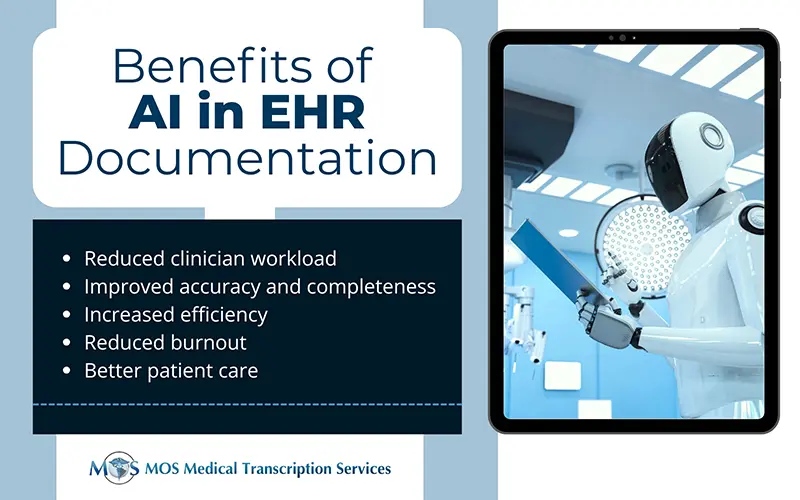Is EHR documentation draining the joy out of practicing medicine?
Table of Contents
Healthcare provider burnout caused by electronic health record (EHR) documentation is a growing concern. Time-consuming data entry pulls physicians away from patient care, increases the risk of medical errors, and lowers patient satisfaction. While solutions like medical dictation services, better workflows, and training offer some relief, the growing adoption of artificial intelligence (AI) in medical transcription is changing the game. AI in EHR documentation presents a promising new way of converting physician dictation to text, reducing transcription turnaround time, and optimizing clinical workflows.

Artificial Intelligence in EHR Documentation: A New Milestone
Conventional clinical documentation is tedious, error-prone, and a major contributor to provider frustration. Studies have shown that the demands of EHR documentation, the stress it creates, and the lack of adequate time to complete it are all linked to lower job satisfaction and higher rates of burnout among providers (Stud Health Technol Inform 2019). As medical practices aim to enhance patient care, reduce physician stress, and ease administrative workloads, AI-powered solutions are becoming essential tools in today’s clinical scenario.
AI significantly improves EHR documentation by automating and streamlining time-consuming manual voice-to-text transcription handled by physicians and medical scribes.
Automating EHR documentation with AI improves charting in several ways:
Automated Data Entry
AI-powered tools can transcribe physician dictations into accurate, structured text, reducing the need for manual typing. This speeds up documentation and minimizes errors caused by fatigue or distractions.
Natural Language Processing (NLP)
AI uses NLP to understand and organize unstructured clinical notes. By extracting information such as diagnoses, medications, and treatment plans efficiently from physician dictation, it creates more complete and consistent records.
Extracting Data from Text
AI technologies unlock the full potential of EHRs by accurately extracting critical information from unstructured clinical notes and free-text fields. This capability transforms scattered data into actionable insights, enabling healthcare providers to make more informed decisions and deliver personalized, high-quality patient care.
Real-Time Medical Documentation Support
AI-driven digital scribes listen during patient visits, allowing providers to focus more on patient interaction rather than note-taking. AI tools capture and transcribe doctor–patient conversations, automatically generating detailed clinical notes within the EHR. It can also draft treatment plans based on the discussion, allowing clinicians to review, edit, and finalize the documentation with minimal manual input.
Standardized Note-Taking
AI-powered systems can generate intelligent, pre-filled templates tailored to specific specialties and clinical scenarios. These templates include relevant fields and prompts that guide healthcare providers through comprehensive and consistent documentation. By automating routine entries and suggesting context-aware information based on patient data and previous notes, AI reduces the time spent on manual input and minimizes errors or omissions.
This standardization not only improves documentation quality but also ensures compliance with regulatory and coding requirements. Clinicians benefit from a streamlined workflow, allowing them to focus more on patient care while maintaining accurate, thorough records.
Error Detection
Integrating AI in EHR documentation can identify inconsistencies, missing information, or potential coding errors in charting, improving accuracy and compliance. For example, the physician documents a patient visit in the EHR and notes a diagnosis of Type 2 diabetes. However, the AI system flags a potential issue-it detects a potential ICD-10 coding mismatch based on the phrasing in the note and recommends a more accurate diagnosis code. This helps ensure clinical accuracy, proper reimbursement, and compliance with documentation standards.
Alerts and Predictions
Traditionally, EHRs have been used to alert clinicians when patient data meets certain criteria, prompting further evaluations or treatments. However, this process can be time-consuming. AI-powered predictive models built on big data can proactively identify high-risk conditions such as sepsis or heart failure before symptoms escalate, allowing for earlier intervention.
Workflow Optimization
By reducing EMR/EHR transcription time, AI helps clinicians spend more time on patient care and less on administrative tasks. AI also empowers healthcare teams to develop clinical protocols in as little as 10 days, improving operational readiness and care quality. In addition, AI tools can manage routine administrative tasks-such as processing medication refills, handling result notifications, and triaging patient requests-helping clinicians prioritize tasks and navigate their to-do lists more efficiently. This leads to enhanced focus on patients, improved provider satisfaction, and reduced burnout.
Clinical Decision Support
Clinical decision support (CDS) systems provide healthcare providers with actionable knowledge to improve patient outcomes. Traditional CDS systems without AI capabilities have often fallen short in significantly enhancing major patient outcomes. However, the integration of machine learning into CDS within EHRs is changing this landscape. AI-powered CDS can identify patients at highest risk of adverse events, optimize treatment plans in real time, and provide timely reminders-such as prompting clinicians to record vital signs like height and weight for BMI calculation or to complete medication reconciliation during office visits.
Leading vendors like IBM Watson Health, Change Healthcare, and Allscripts are actively incorporating AI-driven clinical decision support to enable more personalized and effective care. Additionally, Amazon’s AI solutions offer valuable insights that assist healthcare organizations not only with clinical decision support but also with revenue cycle management and population health initiatives.
Integration and Interoperability
AI-powered EHR documentation can integrate with various EHR systems, regardless of the vendor or platform. This interoperability ensures that AI-driven transcription, data extraction, and documentation enhancements can be directly embedded into existing clinical workflows without disrupting day-to-day operations.
By integrating smoothly with different EHR platforms, AI solutions enable healthcare providers to benefit from improved accuracy, faster documentation, and better data consistency-all within the familiar interface of their current systems. This integration also supports easier data sharing across departments and care teams, promoting coordinated and efficient patient care.
Benefits of AI in EHR Documentation
- Reduced clinician workload: Automating documentation tasks can free up valuable time for direct patient care.
- Improved accuracy and completeness: AI can help ensure that patient records are more accurate and complete, reducing the risk of errors and improving patient safety.
- Increased efficiency: AI can streamline workflows, making documentation faster and more efficient.
- Reduced burnout: By reducing the administrative burden of documentation, AI can help combat clinician burnout and improve job satisfaction.
- Better patient care: By freeing up clinicians to spend more time with patients, AI can ultimately lead to better patient care.
AI in EHR Documentation
Enhancing Accuracy with EHR-Compatible Transcription Solutions
As AI continues to transform EHR documentation, medical transcription companies play a crucial role in helping healthcare providers bridge technology and healthcare delivery. By leveraging AI-powered documentation tools, these companies provide accurate, timely, and compliant EHR-integrated clinical records. By integrating AI in EHR documentation, they ensure high- quality charting and support more informed clinical decisions. Ultimately, outsourcing medical transcription to a technologically advanced service provider reduces physician burnout and supports efficient, patient-centered care.


